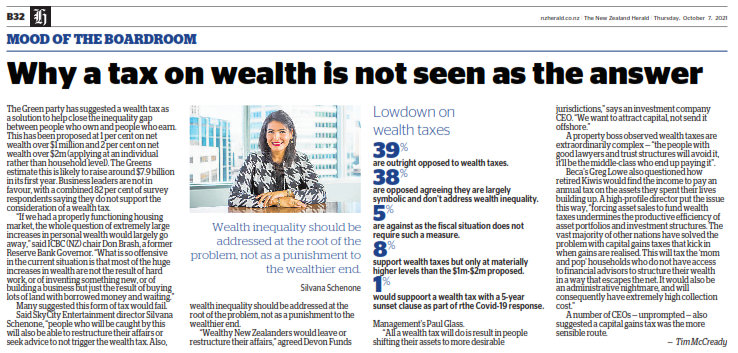Why a tax on wealth is not seen as the answer
The Green party has suggested a wealth tax as a solution to help close the inequality gap between people who own and people who earn. This has been proposed at 1 per cent on net wealth over $1 million and 2 per cent on net wealth over $2m (applying at an individual rather than household level).
The Greens estimate this is likely to raise around $7.9 billion in its first year. Business leaders are not in favour, with a combined 82 per cent of survey respondents saying they do not support the consideration of a wealth tax.
“If we had a properly functioning housing market, the whole question of extremely large increases in personal wealth would largely go away,” said ICBC (NZ) chair Don Brash, a former Reserve Bank Governor. “What is so offensive in the current situation is that most of the huge increases in wealth are not the result of hard work, or of inventing something new, or of building a business but just the result of buying lots of land with borrowed money and waiting.”
Many suggested this form of tax would fail.
Said SkyCity Entertainment director Silvana Schenone, “people who will be caught by this will also be able to restructure their affairs or seek advice to not trigger the wealth tax. Also, wealth inequality should be addressed at the root of the problem, not as a punishment to the wealthier end.
“Wealthy New Zealanders would leave or restructure their affairs,” agreed Devon Funds Management’s Paul Glass.
“All a wealth tax will do is result in people shifting their assets to more desirable jurisdictions,” says an investment company CEO. “We want to attract capital, not send it offshore.”
A property boss observed wealth taxes are extraordinarily complex — “the people with good lawyers and trust structures will avoid it, it’ll be the middle-class who end up paying it”.
Beca’s Greg Lowe also questioned how retired Kiwis would find the income to pay an annual tax on the assets they spent their lives building up. A high-profile director put the issue this way, “forcing asset sales to fund wealth taxes undermines the productive efficiency of asset portfolios and investment structures. The vast majority of other nations have solved the problem with capital gains taxes that kick in when gains are realised. This will tax the ‘mom and pop’ households who do not have access to financial advisors to structure their wealth in a way that escapes the net. It would also be an administrative nightmare, and will consequently have extremely high collection cost.”
A number of CEOs — unprompted — also suggested a capital gains tax was the more sensible route.
